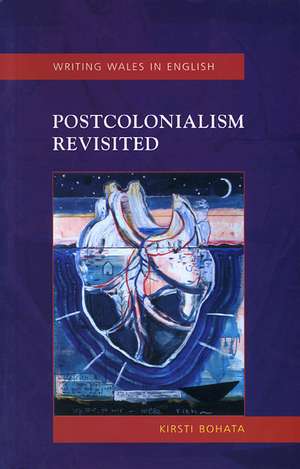Postcolonialism Revisited: University of Wales Press - Writing Wales in English
Autor Kirsti Bohataen Limba Engleză Paperback – 15 sep 2004
Postcolonialism Revisited examines the ways in which postcolonial theory may be usefully adopted and adapted in order to provide an illuminating reading of Welsh writing in English, and how the Anglophone literature of Wales raises questions about the assumptions and dogmas of postcolonial theory.
In addition to dealing with a range of theorists in the field, including Frantz Fanon, Bill Ashcroft and Homi Bhabha, the book looks at how Wales has been constructed as a colonized nation in late-nineteenth- and twentieth-century writing. Authors considered include R. S. Thomas, Margiad Evans, Christopher Meredith, Peter Finch and Rhys Davies.
In addition to dealing with a range of theorists in the field, including Frantz Fanon, Bill Ashcroft and Homi Bhabha, the book looks at how Wales has been constructed as a colonized nation in late-nineteenth- and twentieth-century writing. Authors considered include R. S. Thomas, Margiad Evans, Christopher Meredith, Peter Finch and Rhys Davies.
Preț: 78.89 lei
Nou
Puncte Express: 118
Preț estimativ în valută:
15.10€ • 16.45$ • 12.72£
15.10€ • 16.45$ • 12.72£
Carte disponibilă
Livrare economică 02-16 aprilie
Livrare express 18-22 martie pentru 23.06 lei
Preluare comenzi: 021 569.72.76
Specificații
ISBN-13: 9780708318928
ISBN-10: 0708318924
Pagini: 209
Dimensiuni: 140 x 216 x 15 mm
Greutate: 0.34 kg
Editura: University of Wales Press
Colecția University of Wales Press
Seria University of Wales Press - Writing Wales in English
Locul publicării:United Kingdom
ISBN-10: 0708318924
Pagini: 209
Dimensiuni: 140 x 216 x 15 mm
Greutate: 0.34 kg
Editura: University of Wales Press
Colecția University of Wales Press
Seria University of Wales Press - Writing Wales in English
Locul publicării:United Kingdom
Notă biografică
Kirsti Bohata is Research Associate, CREW (Centre for Research into the English Literature and Language of Wales), University of Wales, Swansea. She has taught at the Universities of Wales, Swansea, Glamorgan and Stuttgart and has published widely on postcolonialism, Welsh writing in English and the fin de siècle.
Cuprins
General Editor’s Preface
Acknowledgements
1 Theoretical Contexts
2 Stereotypes of Alterity: Race, Sexuality and Gender
3 En-gendering a New Wales: Nationalism, Feminism and Empire in the Fin de Siècle
4 The Battle for the Hills: Politicized Landscapes and the Erasure of the Place
5 ‘Devices of Otherness’? Code-switching, Audience and the Politics of Language
6 Hybridity and Authenticity
Notes
Bibliography
Index
Acknowledgements
1 Theoretical Contexts
2 Stereotypes of Alterity: Race, Sexuality and Gender
3 En-gendering a New Wales: Nationalism, Feminism and Empire in the Fin de Siècle
4 The Battle for the Hills: Politicized Landscapes and the Erasure of the Place
5 ‘Devices of Otherness’? Code-switching, Audience and the Politics of Language
6 Hybridity and Authenticity
Notes
Bibliography
Index






